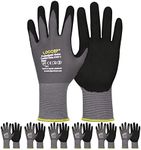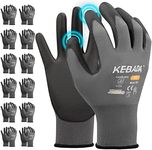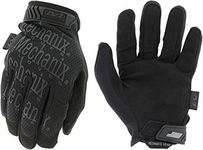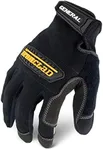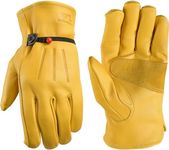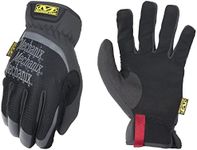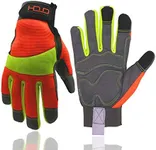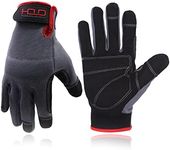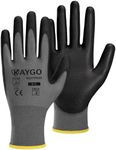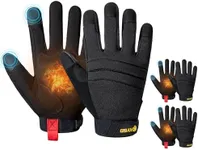Buying Guide for the Best Mechanic Work Gloves
Choosing the right mechanic work gloves is crucial for ensuring safety, comfort, and efficiency while working. The right pair of gloves can protect your hands from cuts, abrasions, chemicals, and other hazards, while also providing the dexterity needed to handle tools and small parts. When selecting mechanic work gloves, consider the specific tasks you'll be performing, the materials you'll be handling, and the environment in which you'll be working. Here are some key specifications to consider when choosing the best mechanic work gloves for your needs.MaterialThe material of the gloves is important because it determines the level of protection, durability, and comfort. Common materials include leather, synthetic leather, nitrile, and fabric. Leather gloves offer excellent durability and protection but may be less flexible. Synthetic leather provides a good balance of protection and flexibility. Nitrile gloves are resistant to chemicals and punctures, making them ideal for handling hazardous materials. Fabric gloves are lightweight and breathable but may offer less protection. Choose the material based on the type of work you'll be doing and the level of protection you need.
Fit and SizeThe fit and size of the gloves are crucial for comfort and functionality. Gloves that are too tight can restrict movement and cause discomfort, while gloves that are too loose can reduce dexterity and increase the risk of accidents. Most gloves come in various sizes, so it's important to measure your hand and refer to the manufacturer's sizing chart. A good fit should allow you to move your fingers freely and handle tools with ease. Consider trying on different sizes to find the one that offers the best balance of comfort and control.
GripGrip is essential for handling tools and parts securely. Gloves with textured or reinforced palms and fingers provide better grip, reducing the risk of slipping and improving precision. Some gloves have additional grip features like silicone or rubberized patterns. If your work involves handling oily or slippery objects, look for gloves with enhanced grip features. The right grip can improve your efficiency and safety while working.
Cut ResistanceCut resistance is important for protecting your hands from sharp objects and tools. Gloves are rated for cut resistance on a scale, with higher numbers indicating greater protection. If your work involves handling sharp tools, metal parts, or glass, choose gloves with a higher cut resistance rating. For less hazardous tasks, lower cut resistance may be sufficient. Assess the level of risk in your work environment to determine the appropriate cut resistance level for your gloves.
DexterityDexterity refers to the ability to perform precise tasks with your fingers while wearing gloves. High dexterity gloves are thinner and more flexible, allowing for better control and manipulation of small parts. However, they may offer less protection. If your work requires fine motor skills, such as assembling small components or working with intricate tools, prioritize gloves with high dexterity. For tasks that require more protection and less precision, thicker gloves may be more suitable.
Impact ProtectionImpact protection is important for tasks that involve heavy tools or machinery. Gloves with padded knuckles and reinforced areas can absorb shocks and reduce the risk of injuries from impacts. If your work involves frequent hammering, drilling, or using power tools, consider gloves with added impact protection. This feature can help prevent bruises and other injuries caused by accidental impacts.
Chemical ResistanceChemical resistance is crucial if you work with solvents, oils, or other hazardous chemicals. Gloves made from nitrile or other chemical-resistant materials can protect your skin from harmful substances. Check the manufacturer's specifications to ensure the gloves are rated for the specific chemicals you'll be handling. For tasks that don't involve chemicals, this feature may not be necessary. Always prioritize your safety by choosing gloves that provide adequate protection against the substances you'll encounter.
